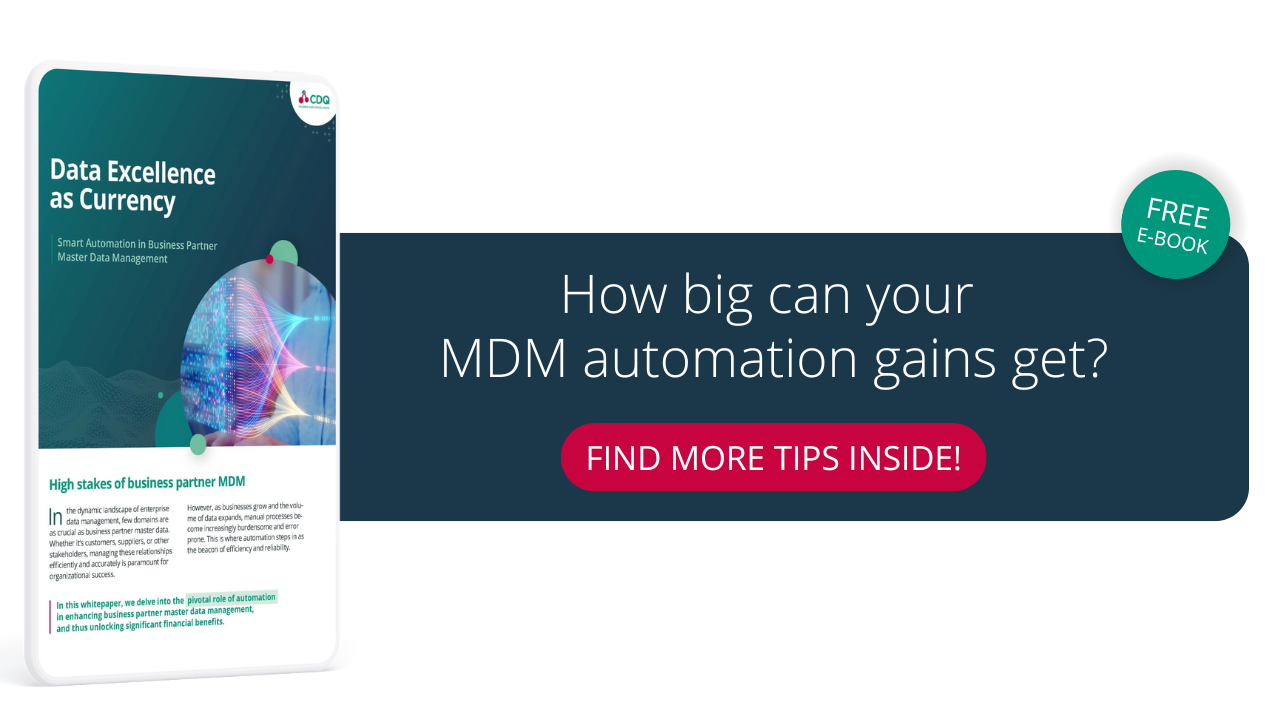Trust, automation, and the future of master data management

Master data management (MDM) is a vital, albeit often underappreciated, foundation of modern business operations. When done right, it ensures smooth processes, minimizes costly errors, and builds trust in the data that drives decisions. But as businesses grow and data complexity surges, manual processes simply don’t cut it.
This was the focal point of a recent SAP Let’s Talk Data podcast featuring Andreas Seifried, solution manager for SAP Master Data Management, and myself. Together, we explored the challenges of manual data management, the transformative power of automation, and how the partnership between SAP and CDQ is making trusted data and automation more accessible than ever.
What do we mean by trusted data?
Let’s start with the basics. Trusted data is the foundation of successful automation. Without trust, data quality suffers, errors creep in, and the business processes relying on that data crumble.
At CDQ, we define trusted data as more than just accurate: it must be verified, compliant, and traceable back to reliable sources. Why? Because businesses need to know their data is as solid as the processes it supports. To make data trustworthy, CDQ focuses on sourcing it from reliable origins, such as tax authorities or national trade registers, and creating a collaborative data-sharing ecosystem. This community approach enables organizations to contribute and access high-quality information, ensuring consistency and reliability across shared data pool.
In our Data Sharing Community, companies contribute and pool parts of their verified data. It’s a mutually beneficial approach: every participant gains access to a shared repository of high-quality, governed data. For example, Covestro, a leader in plastics manufacturing, uses CDQ services to validate bank accounts during supplier onboarding. The result? A significant reduction in manual checks, lower compliance risks, and a streamlined process that saved both time and money.
Trusted data isn’t just a theoretical ideal. It’s a practical enabler for businesses striving to automate and optimize.
The pain of manual master data management
If trusted data is the goal, manual MDM processes often stand in the way. As Andreas pointed out during our conversation, the traditional approach to creating or updating master data is slow, expensive, and error-prone.
Here’s a snapshot of what manual MDM typically looks like:
-
A request is submitted.
-
Someone manually reviews and validates the data, often cross-referencing external sources or spreadsheets.
-
Errors inevitably occur, requiring time-consuming corrections.
And that’s just for creating a new record. Keeping data up-to-date or fixing mistakes that surface downstream is an even bigger challenge. For instance, a typo in a tax ID might not seem critical at first, but when perishable goods are stuck in customs because of it, the business impact becomes clear.
The indirect costs of manual processes are just as significant. Imagine a supplier onboarding process where validating bank account details relies on sending physical forms back and forth. The delay? Up to two weeks. The impact? Slower transactions, delayed projects, and frustrated teams.
The case for automation
So, what’s the alternative?
It’s simple: automation, automation, automation.
By integrating trusted data with automated tools, businesses can eliminate manual inefficiencies and unlock a host of benefits. And it’s not just about speed. It’s about building a scalable system that supports business growth without piling on additional manual work.
One of my favorite success stories involves a global engineering company that streamlined its supplier onboarding process using CDQ’s trusted data services integrated into SAP MDG. They reduced onboarding time from 15 minutes to just 1 minute per record. The savings? Over €180,000 annually.
But the benefits of automation go beyond cost savings:
-
Scalability: Manual processes simply don’t scale. Automation allows businesses to grow without adding headcount or introducing bottlenecks.
-
Employee satisfaction: Let’s face it. No one loves repetitive, error-prone tasks. Automation frees up employees to focus on more strategic work, boosting morale and productivity.
-
Sustainability: Reducing duplicate records doesn’t just save storage space; it also lowers the energy consumption of your systems, aligning with corporate sustainability goals.
Master data automation reduces errors, builds trust in data, and lays the groundwork for advanced technologies like artificial intelligence. Referencing a quote from George Westerman, Andreas pointed out:
When digital transformation is done right, it’s like a caterpillar turning into a butterfly. But when done wrong, all you have is a really fast caterpillar.
How CDQ and SAP make automation seamless
The partnership between CDQ and SAP is a perfect example of how trusted data and automation can work together. By integrating CDQ’s services into SAP MDG, we’ve made it easier than ever for businesses to access high-quality, verified data.
Here are some of the key features:
-
Lookup and create: Users can search for a company directly within their SAP MDG environment. Once they find the right match, they can instantly create a new business partner record, with no manual data entry required.
-
Data enrichment: Existing records can be updated with verified information, such as tax IDs or legal entity details.
-
Mass updates: For larger datasets, automated batch processing eliminates the need for time-consuming, manual intervention.
We’ve also focused on simplifying the setup process. Beyond the technical aspects of connecting SAP MDG to the CDQ platform, we help businesses navigate challenges like semantic mapping, which is critical for aligning different legal forms or data structures across regions.
Additional features of SAP MDG
Automation doesn’t stop with streamlined processes but is also a step towards more advanced capabilities like artificial intelligence. SAP MDG is already incorporating AI-driven features to enhance MDM further:
-
Derivation rules: These allow businesses to automate the calculation of certain attributes based on predefined factors, ensuring consistency and accuracy.
-
Rule mining: By detecting patterns in existing master data, this feature helps organizations create and apply new rules to future data entries.
-
AI enhancements: A recently introduced feature, “Summary of Changes,” uses AI to provide an overview of pending updates. This is particularly helpful for less experienced users, enabling them to make informed decisions.
The future of MDM is here, and it’s powered by trust
At CDQ, we believe that trusted data and automation go hand in hand. Without trusted data, automation is like building on shaky ground. And without automation, managing data at scale becomes unsustainable.
Our partnership with SAP is helping businesses bridge that gap. Together, we’re enabling organizations to automate their MDM processes with confidence, ensuring that their data is not only efficient but also trustworthy.
If your business is still relying on manual processes, now is the time to make a change. Automation isn’t just about working faster: it’s about building a foundation for growth, innovation, and sustainability. Powered by trusted data, the journey from caterpillar to butterfly is worth every step.
Discover how automation can revolutionize MDM by diving into our white paper. Packed with real-world examples and data-backed insights, it offers compelling evidence of automation's transformative impact on master data management.

Get our e-mail!
Related blogs
Master Data Management meets AI: work smarter, not harder
Let's be honest, master data management (MDM) often feels like a Sisyphean task. Wrangling inconsistent data, battling data decay, and striving for a single…
How AI and MDM work together to drive business success
In today's fast-paced world, Artificial Intelligence (AI) is becoming a must-have for making smart decisions, automating tasks, and discovering hidden insights.…
Managing data in the age of AI: F.A.Z. podcast
Well-managed data is the foundation upon which any successful AI strategy must be built. Many companies are aware of the value of data, but the challenge lies…






